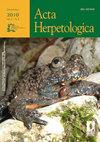意大利北部Chalcides Chalcides (Squamata: Scincidae)食性的初步资料
IF 0.9
4区 生物学
Q4 ZOOLOGY
引用次数: 1
摘要
众所周知,石龙子的饮食主要是欧洲以外的物种,尤其是澳大利亚的物种,在澳大利亚,这些蜥蜴有大量的物种,而相比之下,其他大陆物种的数据很少。三趾石龙子(Chalcides Chalcides)产于北非和意大利的一个受限制地区,在那里它几乎均匀地分布在整个半岛和主要岛屿上。尽管在形态学和生态学等方面进行了充分的研究,但有关营养偏好的数据很少,而且只能用于意大利中南部的人口。在本说明中,我们报告了亚平宁地区三趾石龙子(Chalcides Chalcides)种群在其分布区北部边界的饮食的初步数据。2015年6月,采集了20个个体的粪便内容物,获得了48个猎物的总体样本。蜘蛛目是被捕食最多的分类单元(超过40%),其次是半翅目(35.4%)和其他被捕食分类单元(膜翅目、鞘翅目和Dermaptera),比例要低得多。我们发现,在被捕食的猎物中,体型较小/较年轻和体型较大/较年长的个体之间没有差异。除了证实这种皮肤对蜘蛛的普遍营养偏好外,我们还发现,在意大利中南部的研究种群中,被捕食的物品存在一些有趣的差异。本文章由计算机程序翻译,如有差异,请以英文原文为准。
Preliminary data on the diet of Chalcides chalcides (Squamata: Scincidae) from Northern Italy
The diet in skinks is known mainly for extra-European species, especially from Australian ones, where these lizards are represented by a great number of species, while, in comparison, data for species from other continents are scarce. The three-toed skink, Chalcides chalcides, is found in a restricted part of northern Africa and in Italy, where it is distributed almost uniformly throughout the peninsula and on the major islands. Although it is well studied for aspects such as morphology and ecology, data concerning trophic preferences are scarce, and available only for the populations of south-central Italy. In this note we report preliminary data about the diet of an Apennine population of the three-toed skink, Chalcides chalcides, at the northern boundary of its distribution area. Faecal contents from 20 individuals were collected in June 2015, obtaining an overall sample of 48 prey items. Araneae constituted the most preyed taxon (over 40%), followed by Hemiptera (35,4%) and other prey taxa (Hymenoptera, Coleoptera, and Dermaptera) in much lower percentages. We found no differences between smaller/younger and larger/older individuals in consumed preys. As well as confirming the general trophic predilection of this skink for spiders, we also found some interesting differences in preyed items with studied populations of south-central Italy.
求助全文
通过发布文献求助,成功后即可免费获取论文全文。
去求助
来源期刊

Acta Herpetologica
ZOOLOGY-
CiteScore
1.20
自引率
12.50%
发文量
10
审稿时长
6 months
期刊介绍:
Acta Herpetologica, a journal open to academics all over the world, offers itself as a new site for the presentation and discussion of the most recent results in the field of research on Amphibians and Reptiles, both living and extinct. The official journal of the Societas Herpetologica Italica (S.H.I.), Acta Herpetologica publishes original works – extended articles, short notes and book reviews – mostly in English, dealing with the biology and diversity of Amphibians and Reptiles.
 求助内容:
求助内容: 应助结果提醒方式:
应助结果提醒方式:


